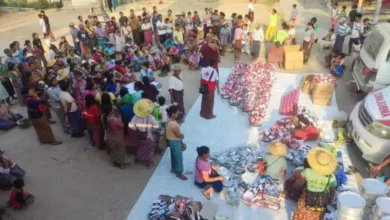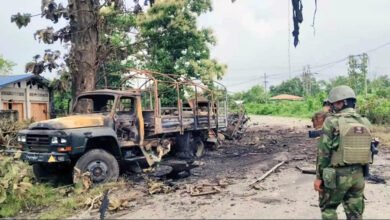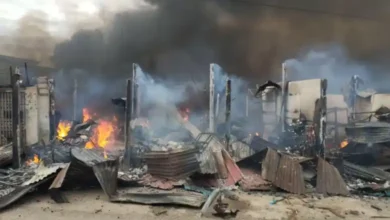Gov’t Restricts Traffic To Hpakant To Fight Virus

The government introduced stricter travel measures it claims will help prevent the spread of COVID-19 in Kachin State’s Hpakant Township.
Locals are afraid of contracting the virus after many Burmese nationals returned from Thailand and China said Zaw Zaw, director for the office of the Kachin State government. Everyone who enters Hpakant will have their ID checked, he said. “We are going to check if they are local and holding Kachin State ID or laborers for jade companies. We are not allowing anyone to enter without a recommendation letter from their village or ward headman.”
Many jade workers return home during the water festival but with celebrations for the Burmese New Year cancelled this year to prevent the spread of the COVID-19 virus the government stopped all buses to the township. Trains are the only mode of transportation. Zaw Zaw explained they’re concerned with travellers entering Hpakant, not those leaving the township.
The government may have other reasons for controlling access to the lucrative Hpakant township. Since the Burma Army broke a seventeen-year ceasefire with the Kachin Independence Organisation in 2011, the Burma Army and its crony companies seized control of the Hpakant jade mines, estimated at up to US$31 billion in 2014, according to 12-month investigation by Global Witness. A figure that accounted for nearly half of Burma’s GDP. Global Witness found profits from the jade mines are controlled by “networks of military elites, drug lords and crony companies associated with the darkest days of junta rule.”
The Kachin State Health Department reported 3,036 people have returned to the state from other countries. More than 840 are still under quarantine. Many were students studying abroad or workers laid off during the lockdown in Thailand.
Burma confirmed its first COVID-19 infection on March 23 after a man returned to Chin State from the US. The government has blamed returnees for a spike in infections but with little testing done before its unclear how many in Burma had contracted the disease before tests started.
Burma shares a large land border with China, where the first novel coronavirus outbreak happened several months ago. With many Chinese travelling to the country for business and tourism, it’s unlikely the first infection happened less than a month ago.
The Ministry of Health and Sports reported there were 28 confirmed cases on April 10. Three people have perished by the virus and two have recovered.




